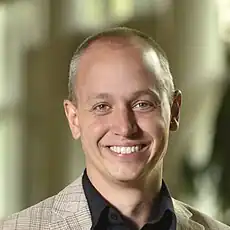Gordon Pennycook | |
|---|---|
 | |
| Born | Carrot River, Saskatchewan, Canada |
| Academic background | |
| Education | BA, 2009, University of Saskatchewan MA, 2011, PhD, 2016, University of Waterloo |
| Thesis | What makes us think?: a three-stage dual-process model of analytic engagement (2016) |
| Academic work | |
| Institutions | University of Regina |
| Website | gordonpennycook |
Gordon Robert Pennycook is a Canadian psychologist who is an associate professor at Cornell University.[1] He is also an adjunct professor of Behavioural Science at the University of Regina's Hill and Levene Schools of Business. In 2020, he was elected to be a member of the Royal Society of Canada’s College of New Scholars, Artists, and Scientists.
Early life and education
Pennycook grew up in Carrot River, Saskatchewan, Canada.[2] He earned his Bachelor of Arts degree at the University of Saskatchewan before enrolling at the University of Waterloo for his Master's degree and PhD.[3] At the University of Waterloo, Pennycook co-authored On the Reception and Detection of Pseudo-Profound Bullshit which won the 2016 Ig Nobel Peace Prize.[4] Upon graduating, he received the Governor General's Gold Medal for outstanding scholastic achievements of a student in Canada and accepted a Social Sciences and Humanities Research Council Banting Postdoctoral Fellowship at Yale University.[5] As a Postdoctoral Fellowship, Pennycook became interested in fake news and conducted studies on people sharing misinformation on social media.[6]
Career
Following his Postdoctoral Fellowship, Pennycook became an assistant professor of Behavioural Science at the University of Regina's Hill and Levene Schools of Business. In 2018, he received a research grant from the Miami Foundation to examine why people fall for fake and hyperpartisan news.[7] He also edited a book, The New Reflectionism in Cognitive Psychology: Why Reason Matters and authored five book chapters. As a result of his academic achievements, Pennycook received the Canadian Society for Brain, Behaviour and Cognitive Science (CSBBCS) Vincent Di Lollo Early Career Award.[8] Later that year, Pennycook was named a member of the Royal Society of Canada’s College of New Scholars, Artists, and Scientists.[9]
References
- ↑ "Gordon Pennycook | Department of Psychology". psychology.cornell.edu. Retrieved 2023-08-29.
- ↑ Gerbic, Susan (August 14, 2019). "Slow Down – Filter and Reflect with Gordon Pennycook". Skeptical Inquirer. Retrieved March 31, 2022.
- ↑ "Gordon Pennycook". University of Waterloo. Retrieved March 31, 2022.
- ↑ "Psychology study on bullsh_t wins Ig Nobel prize at Harvard University". University of Waterloo. September 23, 2016. Retrieved March 31, 2022.
- ↑ "Faculty of Arts takes to the Convocation stage today". University of Waterloo. June 14, 2017. Retrieved March 31, 2022.
- ↑ Ryder, Zena. "INTERVIEW WITH GORDON PENNYCOOK". University of British Columbia. Retrieved March 31, 2022.
- ↑ "Fake news and social media: Research grant success for Dr. Gordon Pennycook". University of Regina. June 14, 2018. Retrieved March 31, 2022.
- ↑ "Not fake news: U of R psychologist wins major national award". University of Regina. March 18, 2020. Retrieved March 31, 2022.
- ↑ "Too good to be true? U of R expert on disinformation honoured with membership into the Royal Society of Canada". University of Regina. September 8, 2020. Retrieved March 31, 2022.
External links
- Gordon Pennycook publications indexed by Google Scholar